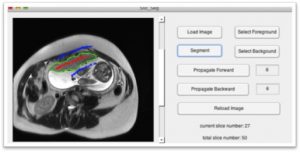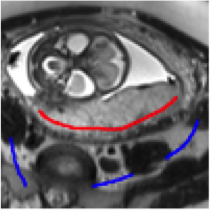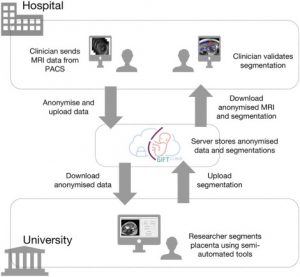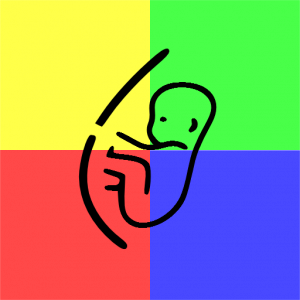GIFT-Surg Software
 Slic-Seg
Slic-Seg
Slic-Seg is open-source software for the interactive segmentation of medical images. Slic-Seg provides a prototype tool that could be used to help identify and analyze organs such as the placenta as part of assessment and treatment planning for fetal surgery and other surgical applications.
Slic-Seg is a minimally interactive online learning-based segmentation method. An online random forest is first trained on data coming from scribbles provided by the user in one single selected start slice. This forms the basis for a slice-by-slice framework that segments subsequent slices before incorporating them into the training set on the fly.
Slic-Seg was developed by Guotai Wang at the Translational Imaging Group at UCL.
Download Slic-Seg (GitHub)
 DyBa ORF
DyBa ORF
DyBa ORF is a Dymanically Balanced Online Random Forest, which addresses three problems in learning with Random Forests:
- Online learning. It can accept gradually arrived training data and update the model on-the-fly.
- Data imbalance. It deals with imbalanced data of different classes, avoiding low correct rate of classification for minor class.
- Changing imbalance ratio. The ratio (degree) of imbalance may dynamically change when new training data arrive sequentially. Compared with traditional Online Random Forest (Saffari, A. 2009, Barinova, O. 2012) which assumes the imblance ratio do not change, DyBa ORF updates the model dynamically with the ability to be adapted to new imbalance ratio.
DyBa ORF was was developed as part of the GIFT-Surg project. The algorithm and software were developed by Guotai Wang at the Translational Imaging Group in the Centre for Medical Image Computing at University College London (UCL).
Download DyBa ORF (GitHub)
endocal
endocal is a cross-platform, lightweight, compact GUI application for the optical distortion calibration of fluid-immersed endoscopes with a custom-made (sterility preserving) calibration target. Following a successful calibration, endocal can also display the live distortion-corrected endoscopic video stream in real time. In addition endocal features a command-line application for generating calibration pattern models to use in computer-aided calibration target fabrication.
endocal was developed by Dzhoshkun I. Shakir and Daniil I. Nikitichev at the Translational Imaging Group in the Centre for Medical Image Computing at University College London (UCL), and is also available on the Python Package Index (PyPI) as a user-friendly installation option.
Watch video of endocal in action [links to UCL Media Central]
Download endocal (Python)
Download endocal (GitHub)
GIFT-Cloud
GIFT-Cloud is a system which tackles many of the data access problems faced by imaging researchers. Key benefits of the system include the ability to easily integrate with the IT systems of hospitals and universities, to support varied collaboration agreements and for the data sharing process to fit easily within routine clinical workflow. This reduces the time burden on clinicians and makes it easier for researchers to access a wider range of imaging data, vital for developing innovative and robust code.
More advanced functions include a new way of anonymising information automatically which clears patient data from both the file metadata and pixel data whilst still allowing for longitudinal studies and the ability to store and share software test results for quick feedback.
GIFT-Cloud was developed by Tom Doel and Dzhoshkun I. Shakir at the Translational Imaging Group in the Centre for Medical Image Computing at University College London (UCL).
Download GIFT-Cloud (GitHub)
GIFT-Grab
GIFT-Grab supports the acquisition, processing and encoding of video streams from medical devices in real time. GIFT-Grab leverages frame-grabber hardware in conjunction with state-of-the-art video acquisition and encoding software. GIFT-Grab is implemented in C++11, but also provides a Python API that is compatible with the popular scientific computing packages NumPy and SciPy.
The GIFT-Grab Python API abstracts video data as NumPy arrays, a datatype used by many state-of-the-art scientific image processing libraries including but not limited to OpenCV, SciPy and its various domain-specific toolkits (SciKits), and Pandas. This abstraction allows for building powerful real-time image processing applications by leveraging the scientific computing capabilities offered by these libraries.
GIFT-Grab was designed and developed by Dzhoshkun I. Shakir, Luis Garcia-Peraza-Herrera, Pankaj Daga, Tom Vercauteren, Tom Doel, and Matt Clarkson at the Translational Imaging Group in the Centre for Medical Image Computing at University College London (UCL).
Download GIFT-Grab (GitHub)
Install GIFT-Grab with pip (Python)
